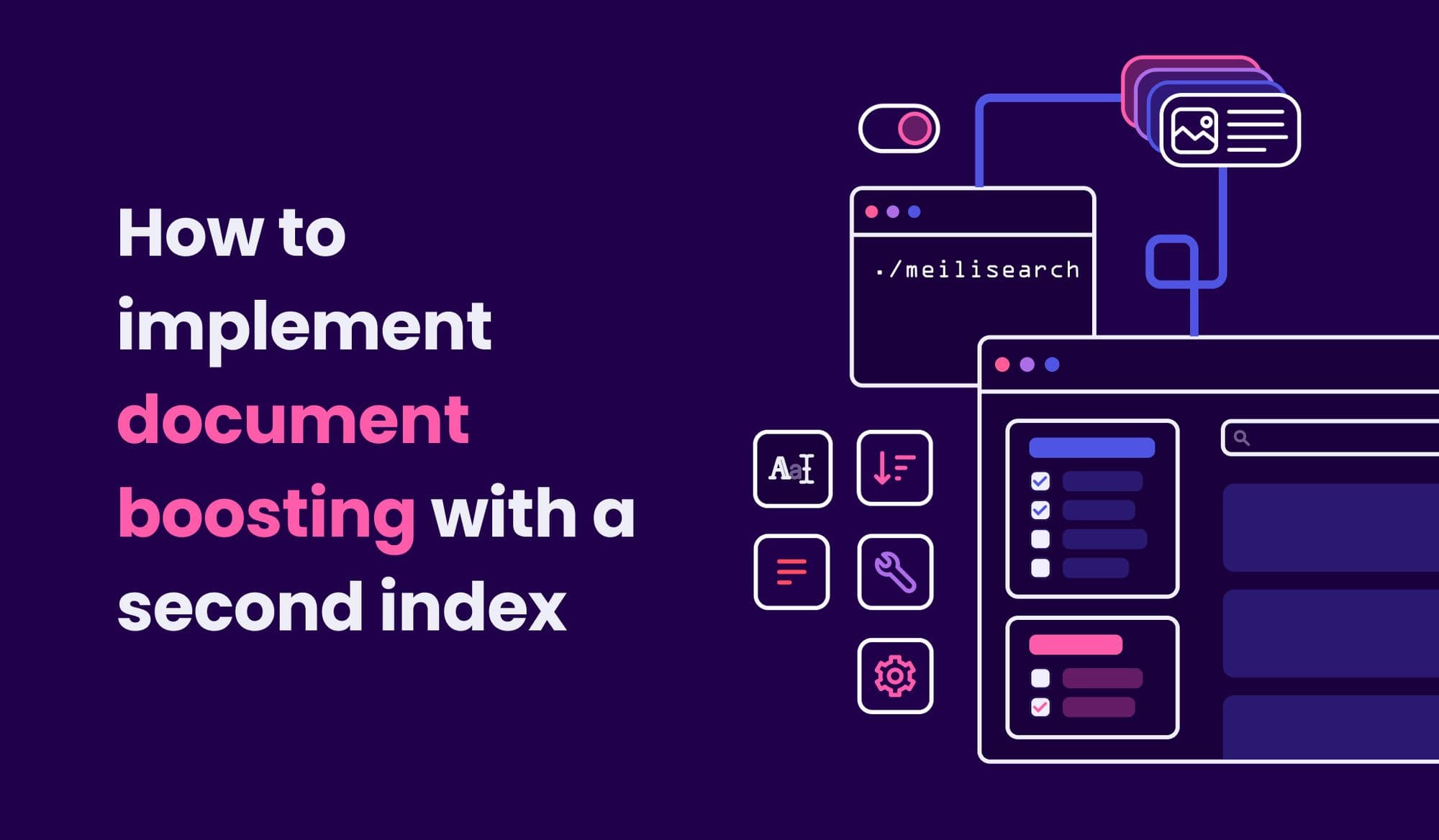How to implement document boosting with a second index
Learn how to implement promoted search results with Meilisearch using a second index for pinned documents.

In this guide, we'll walk you through implementing promoted search results with Meilisearch. Our goal is to search results prioritizing specific documents when certain keywords match a user's query. These boosted documents should be returned at the top of the search results.
This guide explains to implement promoted documents on the backend. For a frontend-first implementation, see implementing promoted search results with React InstantSearch
Overview
Here's a simplified breakdown of how to implement document boosting using a second index for “pinned documents” and the multi-search feature:
- Create Indexes: Set up two indexes: one for regular search and one for boosted results. The boosted index will have a special attribute,
keywords, to trigger the boosting. - Populate the 'games' Index: Populate a
gamesindex with your dataset using the provided JSON file. This index will serve as the source for our boosted documents. - Configure the 'pinned_games' Index: Configure the
pinned_gamesindex to display attributes without revealing keywords. Adjust the searchable and displayed attributes accordingly. - Boost Documents: Identify documents you want to boost and assign relevant keywords to them. For instance, you can assign the keywords
fpsandshooterto the gameCounter-Strike. - Implement the Multi-Search: Utilize Meilisearch's multi-search feature to perform a search query across both the regular and boosted indexes. This way, boosted documents matching keywords will appear first.
- Display Results: Present the search results in a user-friendly format, highlighting boosted documents with a visual indicator.
Implementation
Installation
Before diving in, make sure you have Meilisearch up and running. If you haven't installed it yet, follow these steps:
- Launch a Meilisearch instance — you can run Meilisearch in local or via Meilisearch Cloud.
- Ensure you have your favorite language SDK (or framework integration) installed.
This guide uses the Python SDK, but it works the same with any other Meilisearch integration. 🎉
Initializing indexes
For our example, we'll work with a dataset of Steam games. You can adapt this process to your own data:
- Download the
steam-games.jsonandsettings.jsonfiles for our Steam games dataset - Load the dataset in your Meilisearch instance by adding documents from the
steam-games.jsonfile.
games index
import meilisearch import json from typing import Callable client = meilisearch.Client(url="http://localhost:7700") games = client.index("games") # helper to wait for Meilisearch tasks def wait_with_progress(client: meilisearch.Client, task_uid: int): while True: try: client.wait_for_task(task_uid, timeout_in_ms=1000) break except meilisearch.errors.MeilisearchTimeoutError: print(".", end="") task = client.get_task(task_uid) print(f" {task.status}") if task.error is not None: print(f"{task.error}") print("Adding settings...", end="") with open("settings.json") as settings_file: settings = json.load(settings_file) task = games.update_settings(settings) wait_with_progress(client, task.task_uid) with open("steam-games.json") as documents_file: documents = json.load(documents_file) task = games.add_documents_json(documents) print("Adding documents...", end="") wait_with_progress(client, task.task_uid)
pinned_games index
This index will contain the promoted documents. The settings of the pinned_games index are the same as the games index, with the following differences:
- the only
searchableAttributesis thekeywordsattribute containing the words that trigger pinning that document. - the
displayedAttributesare all the attributes of the documents, except forkeywords(we don't want to show the keywords to end-users)
pinned = client.index("pinned_games") print("Adding settings...", end="") with open("settings.json") as settings_file: settings = json.load(settings_file) settings["searchableAttributes"] = ["keywords"] # all but "keywords" settings["displayedAttributes"] = ["name", "description", "id", "price", "image", "releaseDate", "recommendationCount", "platforms", "players", "genres", "misc"] task = pinned.update_settings(settings) # see `wait_with_progress` implementation in previous code sample wait_with_progress(client, task.task_uid)
Updating the promoted documents index
We'll now populate the index with documents from the games index that we want to promote.
As an example, let's say we want to pin the game "Counter-Strike" to the "fps" and "first", "person", "shooter" keywords.
counter_strike = games.get_document(document_id=10) counter_strike.keywords = ["fps", "first", "person", "shooter"] print("Adding pinned document...", end="") task = pinned.add_documents(dict(counter_strike)) wait_with_progress(client, task.task_uid)
Customizing search results
Now, let’s create a function to return the search results with the pinned documents.
from copy import deepcopy from typing import Any, Dict, List from dataclasses import dataclass @dataclass class SearchResults: pinned: List[Dict[str, Any]] regular: List[Dict[str, Any]] def search_with_pinned(client: meilisearch.Client, query: Dict[str, Any]) -> SearchResults: pinned_query = deepcopy(query) pinned_query["indexUid"] = "pinned_games" regular_query = deepcopy(query) regular_query["indexUid"] = "games" results = client.multi_search([pinned_query, regular_query]) # fetch the limit that was passed to each query so that we can respect that value when getting the results from each source limit = results["results"][0]["limit"] # fetch as many results from the pinned source as possible pinned_results = results["results"][0]["hits"] # only fetch results from the regular source up to limit regular_results = results["results"][1]["hits"][:(limit-len(pinned_results))] return SearchResults(pinned=pinned_results, regular=regular_results)
We can use this function to retrieve our search results with promoted documents:
results = search_with_pinned(client, {"q": "first person shoot", "attributesToRetrieve": ["name"]})
The results object should look like:
SearchResults(pinned=[{'name': 'Counter-Strike'}], regular=[{'name': 'Rogue Shooter: The FPS Roguelike'}, {'name': 'Rocket Shooter'}, {'name': 'Masked Shooters 2'}, {'name': 'Alpha Decay'}, {'name': 'Red Trigger'}, {'name': 'RAGE'}, {'name': 'BRINK'}, {'name': 'Voice of Pripyat'}, {'name': 'HAWKEN'}, {'name': 'Ziggurat'}, {'name': 'Dirty Bomb'}, {'name': 'Gunscape'}, {'name': 'Descent: Underground'}, {'name': 'Putrefaction'}, {'name': 'Killing Room'}, {'name': 'Hard Reset Redux'}, {'name': 'Bunny Hop League'}, {'name': 'Kimulator : Fight for your destiny'}, {'name': 'Intrude'}])
Tada 🎉 You now have a search results object that contains two arrays: the promoted results and the “regular” ones.
Got stuck? Don’t hesitate to ask for help in our Discord community.
Going further
This tutorial explored one approach for implementing promoted results. An alternative technique would be implementing documents pinning in the frontend; take a look at our React implementation guidehis different approach has the benefits of being compatible with InstantSearch.
Both techniques can achieve similar results. We also plan to integrate promoted documents in the Meilisearch engine. Give your feedback on the previous link to help us prioritize it.
For more things Meilisearch, you can subscribe to our newsletter. You can learn more about our product by checking out the roadmap and participating in our product discussions.
For anything else, join our developers community on Discord.
Cheers!


